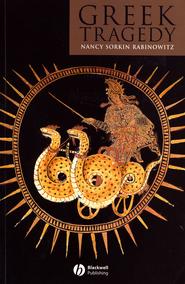
Nancy Sorkin Rabinowitz, the Margaret Bundy Scott Professor of Comparative Literature, has published a new book titled Greek Tragedy (Wiley and Blackwell).
The book provides answers to the question "Why does Greek tragedy continue to matter to us?" The conditions leading to its emergence inAthens
At the same time, in part through its examination of contemporary performance practice, in part through its detailed reading of selected plays, the book explains why tragedy—a key element in the creation of democracy and a public forum where basic issues of politics, family, and gender relationships were considered in antiquity—continues to provide modern audiences with sources of both pleasure and intellectual interest.
The book provides answers to the question "Why does Greek tragedy continue to matter to us?" The conditions leading to its emergence in
At the same time, in part through its examination of contemporary performance practice, in part through its detailed reading of selected plays, the book explains why tragedy—a key element in the creation of democracy and a public forum where basic issues of politics, family, and gender relationships were considered in antiquity—continues to provide modern audiences with sources of both pleasure and intellectual interest.
